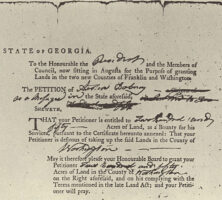Austin Dabney was an enslaved African American who became a private in the Georgia militia and fought against the British during the Revolutionary War (1775-83). He was the only Black patriot to be granted land by the state of Georgia in recognition of his bravery and service during the Revolution and one of the few to receive a federal military pension.
Born in Wake County, North Carolina, in the 1760s, Austin Dabney was brought to Wilkes County, Georgia, in the late 1770s by Richard Aycock—his enslaver and, reputedly, his father. In order to avoid military service himself, Aycock sent Dabney to join the Georgia militia as a substitute. Dabney served as an artilleryman under Elijah Clarke and is believed to have been the only Black soldier to take part in the Battle of Kettle Creek on February 14, 1779. However, recent research suggests Dabney more likely participated in the fighting at Augusta in May 1781. Accounts agree that Dabney was severely wounded in battle and taken to recover in the home of a white family, the Harrises.
On August 14, 1786, Dabney became the only African American to be granted land, 250 acres, by the state of Georgia in recognition of his military service during the Revolution. The legislature also provided seventy pounds to emancipate Dabney from Aycock.

From The Black Presence in the Era of the American Revolution, by S. Kaplan and E. N. Kaplan
Although a war veteran, Dabney’s race precluded him from participating in any of the Georgia land lotteries of the early 1800s. Stephen Upson, a state legislator and friend of the Harris family, supported Dabney’s cause and sponsored a resolution to provide him with additional land not distributed in the 1819 lottery. In 1821 Dabney received a plot of 112 acres in Walton County. In addition to the two land grants, Dabney also received a federal invalid pension of sixty dollars a year starting in 1789 (which increased to ninety-six dollars annually in 1816) for the wound he received in the war.
The relationship between Dabney and the Harris family continued for the rest of Dabney’s life. He followed them to Walton, Burke, and Pike counties, and in 1835 William Harris named a son, Austin Dabney Harris, in Dabney’s honor. At his death in Zebulon in 1830, Dabney left all his land and property to William Harris and was buried in the Harris family plot in Pike County. His name appears on a historical marker in Griffin, and U.S. senator Max Cleland of Georgia lauded him on the Senate floor in February 1998 for his military service.






